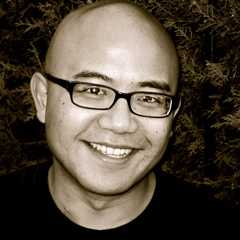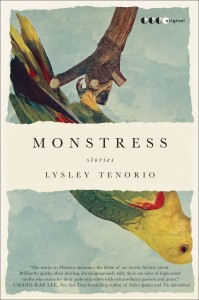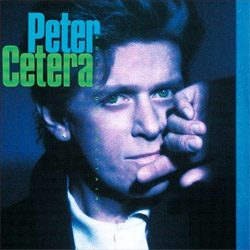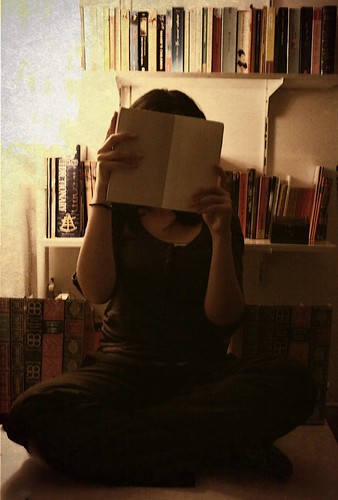 When I first met Lysley Tenorio in the seventh-floor copy room at the University of Wisconsin, he appeared harmless enough. But little did I know that one academic year later, our experiences together would include: having our mugshots taken along a local “Trollway,” buying condiments at the world-famous National Mustard Museum, and watching fifty-foot-tall Bert and Ernie airborne in the Wisconsin winter.
When I first met Lysley Tenorio in the seventh-floor copy room at the University of Wisconsin, he appeared harmless enough. But little did I know that one academic year later, our experiences together would include: having our mugshots taken along a local “Trollway,” buying condiments at the world-famous National Mustard Museum, and watching fifty-foot-tall Bert and Ernie airborne in the Wisconsin winter.
In addition to surviving a plate of “seasoned-for-natives” kung pao chicken during his year in Wisconsin, Lysley Tenorio is also distinguished as having earned perhaps the most fellowships for emerging writers in the country. He has served as a Bennett Fellow at Phillips Exeter Academy, a McCreight Fellow at the University of Wisconsin, a Wallace Stegner Fellow at Stanford University, a John Steinbeck Fellow at San Jose State University, and a resident at Yaddo and MacDowell colonies. In addition to receiving the Whiting Writers Award and the National Endowment for the Arts fellowship, Lysley’s work has appeared in such publications as The Atlantic, Ploughshares, The Chicago Times, and Manoa. His long-awaited debut collection, Monstress, has just been released by Ecco.
A reviewer at the Los Angeles Times writes: “Tenorio’s stories, set amid mingling nationalities and generations, prompt comparisons to the works of Junot Díaz and Jhumpa Lahiri… but the refreshingly wry stories in Monstress are rangier and less concerned with documenting the specific experience of emigrating. Instead they’re focused on uncanny moments when a character realizes that something essential to his or her life might be as false and frightening as [a] bucket of blood.”
Over the course of several online conversations, Lysley and I spoke about some of his favorite celebrity alter egos (Peter Cetera, Buffy the Vampire Slayer), the super powers we longed for, and occasionally, fiction.
Interview
Quan Barry: Okay, let’s get the boring stuff out of the way, i.e.: identity politics and their influence or lack thereof on your writing. As Mike Myers’s character Linda Richman might say, “You are neither white nor straight. Discuss.”
 Lysley Tenorio: What about SECRET identity politics? What are the political implications of a caped crusader posing as a millionaire playboy anyway? We’ll get Christian Bale on the case. Or better yet, Adam West. As for my identity politics? I’d say my first attempt at writing short stories—way back during my senior year in college–was very much politically inspired, full of agendas meant to educate any potential reader on my own views on the American identity in the context of the immigrant experience. As a result, everything came out like an Immigrant-Movie-of-the-Week on the Lifetime network. Flat. Didactic. Labored. That said, I never wrote about my own life, and I think the attempt to imagine the lives of people from different ethnic backgrounds was essential in my committing to writing fiction. While Monstress is full of Filipino and Filipino-American characters, I see them first as individuals caught up in weird, sometimes ridiculous, and always (I hope) emotionally complex circumstances that have nothing to do with my own experience as a Filipino American. That’s the fun of fiction, getting into someone else’s business. So in that sense, I think I’ve set aside identity politics, and instead become more concerned with simply telling a compelling story full of characters with whom readers can hopefully empathize.
Lysley Tenorio: What about SECRET identity politics? What are the political implications of a caped crusader posing as a millionaire playboy anyway? We’ll get Christian Bale on the case. Or better yet, Adam West. As for my identity politics? I’d say my first attempt at writing short stories—way back during my senior year in college–was very much politically inspired, full of agendas meant to educate any potential reader on my own views on the American identity in the context of the immigrant experience. As a result, everything came out like an Immigrant-Movie-of-the-Week on the Lifetime network. Flat. Didactic. Labored. That said, I never wrote about my own life, and I think the attempt to imagine the lives of people from different ethnic backgrounds was essential in my committing to writing fiction. While Monstress is full of Filipino and Filipino-American characters, I see them first as individuals caught up in weird, sometimes ridiculous, and always (I hope) emotionally complex circumstances that have nothing to do with my own experience as a Filipino American. That’s the fun of fiction, getting into someone else’s business. So in that sense, I think I’ve set aside identity politics, and instead become more concerned with simply telling a compelling story full of characters with whom readers can hopefully empathize.
I hear what you’re saying, but we live in America where we like us some qualifiers. Ever worry that you’ll be pigeon-holed as “that Filipino writer?”
I do think about that, sure. On one hand, it could be a lucky thing to be known as “that Filipino writer”; it probably beats being completely unknown. At the same time, I would hope my stories—which I think are ultimately about individuals simply trying to make their way through the world—would allow me to simply be viewed as a writer. Or, perhaps more importantly (for reasons personal, political, psychological, etc.) an American writer. My stories, to me, feel quintessentially American. I write American fiction. So in that sense, I don’t want to be pigeon-holed at all.
Speaking of quintessentially American stories, there’s something almost pulp-fiction-esque about your work. I.e.: if your subjects were “ripped from the headlines,” they’d be ripped from the back pages of stuff you find in comic book shops, books with titles like Weird Tales and I Was A Teenage Werewolf. To be specific, you have characters making B-movies, suffering from leprosy, performing psychic surgery, to name just a few. Having said all this, your treatment of these subjects isn’t sensational in the tabloid sense, but fairly realistic. What draws you to these characters, and how do you find the human in the fantastic?
I like the challenge these characters present. How, for example, can you build an emotionally and psychologically complex story around a Filipino psychic surgeon who travels abroad to dupe other Filipinos into falling for his scam? More importantly, how can you render his story with empathy, in ways that might simultaneously indict and redeem him? It’s fun imagining my way into the heads of people in these weird, sometimes ridiculous situations. The key is for me to remember that, as narrow-minded as some of these characters might seem, they’re ultimately full of good intentions, even if they only serve themselves. Selfish as that might be, there’s still something important in that. Maybe it’s self-preservation. Maybe that’s all human beings are really about. If so, that’s what makes the case for these characters, what brings to the surface their humanity, even in the midst of the seemingly unbelievable.

Peter Cetera "Solitude/Solitaire"
You and I have long running jokes on everything from Peter Cetera (I just realized he’s an ET away from etc) to reproductive organs to salads made entirely of hard boiled eggs. Plus, you performed improv when you were an undergraduate. Most people who know you say you’re the funniest person they know. And yet, most of your stories tend more toward heartbreak than they do toward humor. Is it a conscious decision on your part to check your sense of humor at the door when you sit down to write?
Funniest? I’ve gotten hottest, leggiest, bustiest. But funniest? Not so sure. But I appreciate that you’re reading the heartbreak in these stories, because I’m sometimes paranoid that my stories are too (seemingly) whimsical—the making of a horror movie, a group of guys who want to kick the shit out of the Beatles, etc. Certainly, I’m aware of the “lightness” of these scenarios, but I’m interested in contrasting that with their inherent darkness. So, while I don’t check my sense of humor at the door, I try not to make it a priority, or manipulate plot for the sake of a joke. Humor, in fiction, isn’t a joke; it’s merely another aspect of the truth. If I can get at that while at the same time exploring some of the darker tones of the piece, then that’s great. And by the way, I contacted Peter (ET)Cetera for a blurb, and the bastard wouldn’t take my call. “Man who will fight for your honor,” my ass.
You should’ve asked. I would’ve legally changed my name to Peter Cetera and written you a blurb (“The next time you fall in love, it’ll be with this book!”), then paid the $220 processing fee assessed in the state of Wisconsin to change my name back.
Now you tell me.
I know Buffy the Vampire Slayer used to be an important part of your life. What do you think TV and movies can teach fiction writers about their craft?
On more obvious levels, they can serve as decent models for structure—linear, non-linear, modular, etc. But I think they can also teach the writer the value of what I call “going for broke.” In other words, those seemingly melodramatic, high-action moments on TV and in the movies that often get the slo-mo treatment, and are scored with blaring trumpets or sorrowful violins, or given the extreme close-up of the emotionally wrenched facial expression. When you’re drafting a piece, it can be helpful to indulge those big moments in the story, so long as you know you’ll (usually) have to reel it in a little more for the next draft, and the draft after.
Because a lot of TV and movies are over the top, it can inspire “overwriting,” which in the earlier stages can be a good thing, because it can provide a sense of dramatic, emotional, or tonal destination: where do you want the reader to arrive in a particular scene or chapter? How can you locate them in just the right emotional plane of response? I can think of specific moments from Buffy, for example, that had some of these moments (the episodes “Becoming” and “The Gift” are full of them), and while one might say they were overdone, they provided a huge dramatic payoff. In terms of narrative and drama, there’s a lot to be learned from that. Plus, I now know how to protect myself from the forces of darkness, so bonus for me!
And since we’re in Buffy mode, I know you used to claim that if you could have any super power, you would want the power to always be able to choose the shortest line. Like at the bank or on the highway at a toll booth or at the grocery store. If you could instantly master any aspect of writing, what would it be and why?
Right now, I’d be interested in mastering the kind of omniscient POV that can shift character perspectives seamlessly within the same paragraph, seemingly in the same moment. I imagine that’s old hat to many writers, but the ability to access a story from these multiple consciousnesses within such a relatively small narrative frame (I’m thinking short story here) seems to be quite a feat. Now, would I prefer that over the superpower to always choose the shortest line? I can’t really say.
 I know you’re in the first stages of writing a novel. What is the most daunting part of it? What have you been surprised by so far?
I know you’re in the first stages of writing a novel. What is the most daunting part of it? What have you been surprised by so far?
The most daunting part of writing a novel is the thing that was also—initially—the most liberating: the seemingly endless amount of space in which to work. Obviously, as I revise, I’ll cut and condense and compress, but for a year, as I worked on the first draft, I found myself not needing to worry about the number of pages I’d written, and the publishability (in magazines) of a longer story. The other daunting thing is the idea of commitment, of living with these characters for such a long haul.
If there’s a question you want to be asked, what would it be?
“Do you come from the land down under?” If not that, then how about one of these:
“Why fiction?”
“What do you think is the best sentence in your book?”
“What does your mom think of the book?”
Okay. I’ll give you two out of three. Why fiction? What do you think is the best sentence in your book and why?
Why fiction? Because it lets me immerse myself in the outlandish, daring, foolish, dangerous, mysterious, cruel, and impossible dramas that I wouldn’t have the guts to live out in real life.
Best sentence: Can I pick two? The first: “Even when I was gone, I was here.” That’s my character’s struggle, in a nutshell. Once I got to that line in “L’amour, CA,” I finally understood it. The second: “First my enemies underestimate me, then I smash them.” I love the words “enemies” and “smash,” and if they can exist in the same sentence, then I’m a happy man.
What’s the worst sentence? If you can’t answer that, then what kinds of sentences do you generally hate in fiction and why?
“Get me off this goddamn island!”

I don’t get it. What is that? Gilligan? Survivor?
It’s from my story, “The View From Culion.” One of the more (melo)dramatic lines, at least, out of context. Hopefully, within context, it’s not so bad.
So you didn’t answer the second part of that question. What kind of sentences don’t you like and why?
I have problems with sentences that use the word “gingerly.” I only experience that word when reading, not in real life, so it always feels overtly literary to me. I’m not a fan of sentences that include footnotes. I see the writer at work in those kinds of sentences, and I’m more concerned with narrative than I am with authorial process. Also not a fan of long, long, long, long run-on sentences, for the same aforementioned reasons.
Any final thoughts, theories, comments?
My most immediate final thought right now is that I had way too much Thai food tonight.
My second most immediate final thought/theory/comment is that everything I’ve said here, anything I’ve claimed to understand about my writing, material, and process is subject to change which, when it comes to writing fiction (or any act of creating), is most definitely a good thing.
Interviewer
Quan Barry is the author of the poetry collections Asylum, Controvertibles, and Water Puppets. Her poems have appeared in The New Yorker, The Missouri Review, Ploughshares, The Kenyon Review, and elsewhere. She is the recipient of the Agnes Lynch Starrett Prize (for Asylum).
Further Links and Resources
- Listen to Lysley Tenorio read from his short story “Monstress” for KQED public radio.
- Lysley’s top three book recommendations.
- Read his story, “L’amour, CA,” online at The Atlantic.





